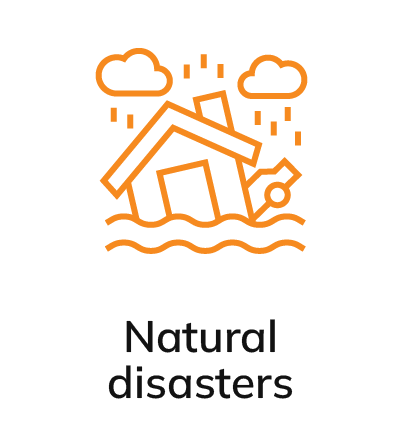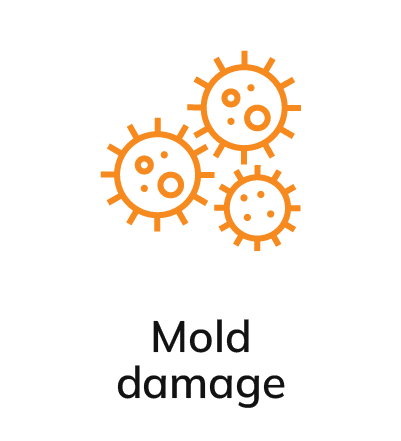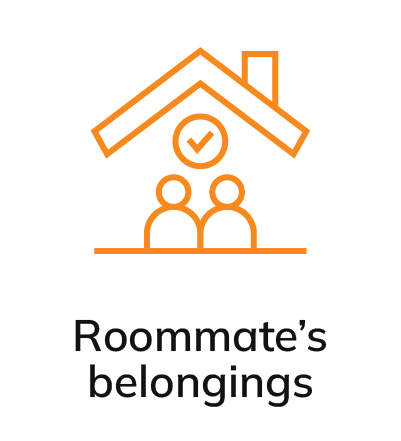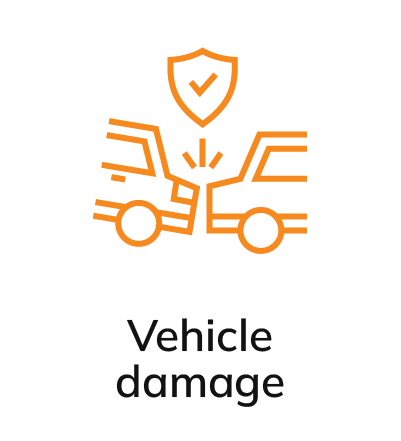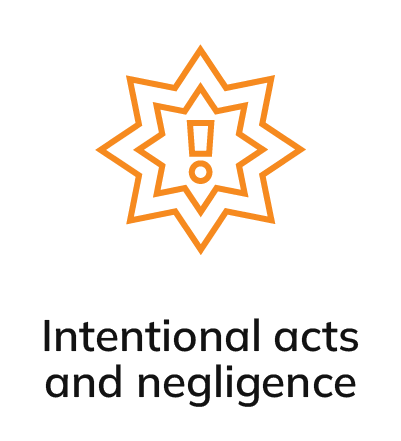You probably know by now that renters insurance is a smart way to protect your belongings and shield yourself from certain liabilities. But before you assume you’re covered for every possible scenario, it’s important to ask: What does renters insurance not cover?
Many renters are surprised to learn that some events and even personal items are excluded from standard policies, have limited coverage, or require additional opt-ins. So, let’s dive into the most common types of events and items that may have some limitations or exclusions, to help you avoid an unexpected situation. Your future self will thank you — and you’ll gain more peace of mind.
Natural disasters
If you’re wondering what renters insurance doesn’t cover, natural disasters like earthquakes and floods are high on the list. Standard renters insurance policies typically don’t cover damage caused by these events. So, if you live in an area prone to these events, you might need to purchase separate policies to stay protected.
Floods
If your apartment floods due to a natural disaster, you’ll need separate flood insurance through the National Flood Insurance Program (NFIP) or a private insurer. However, if the damage isn’t caused by flooding, your renters insurance may cover other losses to your belongings from hurricanes, tornadoes, or thunderstorms. You may also receive some financial compensation if such natural events damage your apartment, preventing you from living there for a while.
Earthquakes
Not all insurance providers offer coverage for damages caused by an earthquake, but some do. For instance, ResidentShield Insurance provides earthquake coverage in California.

If you live in an earthquake-prone area, it’s crucial to consider this as an add-on to your policy. Don’t forget that earthquake insurance rates vary based on location and risk, so you should check this information with your insurer.
Wildfires and fire incidents
Renters insurance usually covers accidental fires and wildfires, helping to pay for damaged belongings and temporary housing, if needed. However, intentional fires may not be covered, especially if the policyholder is found responsible. Also, some policies may also exclude coverage for certain types of fires, so it’s important to carefully review your policy and speak with your insurance provider to fully understand what is and isn’t covered.
Pest issues
Bed bugs, termites, and rodents can cause expensive damage, but, typically, renters insurance doesn’t cover pest infestations. That’s because these issues are seen as preventable maintenance problems, which means landlords are usually responsible for handling them. If you live in a city where bed bugs are common, don’t forget to check your lease agreement to see whether your landlord provides pest control services.
If you’re insured with ResidentShield, you’re in luck, since ResidentShield Insurance provides coverage for bed bug damage. Contact your insurance consultant to find out more.
Mold damage
Renters insurance policies generally exclude mold damage, especially if it results from neglect or ongoing maintenance issues. However, if mold is caused by a sudden and accidental event (like a burst pipe), your policy might cover removal and repairs, as well as help with additional living expenses — in case you need to move because of it.
That said, if you live in a humid climate, using a dehumidifier can help prevent mold growth and costly repairs. Airing the rooms and using proper ventilation can also come in handy for keeping you protected from mold and mildew.
High-value items
If you own expensive objects like jewelry, designer handbags, professional musical instruments, or rare collectibles, standard renters insurance may not provide enough coverage to fully reimburse you if they’re lost, stolen, or damaged. In such cases, you might only receive partial compensation.
– Jewelry & watches — Coverage is typically limited to around $1,000–$1,500. So, if, for instance, you own an engagement ring worth $5,000, you’d receive a fraction of its value unless you have extra coverage.
– Collectibles & antiques — Items like rare coins, vintage toys, or fine art may not be fully covered unless specifically listed in your policy.
– Musical instruments — If you own professional instruments, check your policy, as they may only be partially covered, especially if used for work.

If you own valuable items, talk to your insurer about scheduled personal property coverage (also known as a “rider” or “endorsement”), which offers higher limits and broader protection. Some insurance companies also offer separate policies for valuables, with broader coverage (including international) but likely lower deductibles.
Roommate’s belongings
Generally, your renters insurance policy only covers your personal property — not your roommate’s. Even if you live together, their belongings won’t be covered under your policy unless they are specifically included. So, if your roommate wants protection, they’ll need to purchase their own renters insurance policy.
On the other hand, some insurers allow roommates to share a policy. For instance, ResidentShield Insurance has the option to name up to four non-related roommates on one policy, making living together more cost-effective.
Vehicle damage
When it comes to protecting your car, many assume that renters insurance will offer coverage for vehicle damage or theft. However, what renters insurance doesn’t cover is the actual damage to your vehicle. This type of insurance is designed to protect your personal belongings and liability within your rental unit. So, if your vehicle is involved in an accident, vandalized, or stolen, your renters insurance policy won’t provide coverage.

While your policy won’t cover the physical damage to your vehicle itself, it may cover personal items stolen from your car — but only up to the limits of your personal property coverage. For example, if your laptop or phone is taken from your car when parked on the property, renters insurance might reimburse you for those items, depending on your policy’s coverage limits.
To protect your vehicle against theft, accidents, or weather damage, you’ll need separate, comprehensive auto insurance.
Business equipment
If you run a business out of your apartment, keep in mind that, generally, standard renters insurance does not cover business-related losses. There are also implications when it comes to liability coverage. For example, if a client or customer gets injured at your home, renters insurance won’t cover legal fees — you’ll additionally need business liability insurance.
If you’re self-employed and work from home, check with your insurer to make sure you have the right coverage. Usually, to cover business equipment like computers, cameras, or tools, you may need to add a business property rider or endorsement to your policy.
ResidentShield offers coverage for loss or damage to business personal items both on your property and away from the residence premises. Talk to your insurance representative to learn more about the options and limits for coverage.
Intentional acts and negligence
Renters insurance is designed to cover accidents and unforeseen events. However, if you intentionally cause damage or are negligent, your policy won’t cover the costs.
For instance, if you accidentally start a fire in your apartment, your policy will likely cover the damage. However, if you intentionally cause damage, you’ll be responsible for the repair costs.
Final recommendations
Now that you know more about what renters insurance doesn’t cover (or may not cover fully), it’s a good idea to:
– Read your policy carefully to understand its coverage and limits.
– Always have an updated inventory of your belongings and consider keeping detailed records, especially of your most expensive items.
– Ask your insurance provider about add-ons or riders for extra protection. Share any concerns to make sure you have the appropriate coverage for your needs.
– Consider additional coverage for floods, earthquakes, high-value items, and business equipment if needed.

Knowing the answer to the question “What does renters insurance not cover?” can save you many headaches when facing an unexpected situation. By being aware of potential exclusions, you can make more informed decisions and ensure you and your belongings are fully protected. This way you can focus on living life to the fullest, not worrying about what could go wrong!
If you have ResidentShield Insurance, below you can check out the extent of coverage for the most common events and belongings. Contact your insurance agent to find out more!
| TYPE OF EVENT/ITEM | COVERAGE WITH RESIDENTSHIELD INSURANCE |
| Fire | Yes |
| Wind | Yes, with $1,000 deductible |
| Lightning | Yes |
| Water damage | Yes (sewer – up to $5,000 resident personal property) |
| Flood | No |
| Earthquake | Only in California (not all insurers cover it) |
| Theft | Yes, with a $500 deductible (not when your car is stolen) |
| Bed bugs | Yes (not all insurers cover it) |
| Pet damage | Yes (up to $500 per occurrence) |
| Money, coins | Yes (up to $200) |
| Securities, manuscripts, or stamps | Yes (up to $1,500) |
| Silverware, goldware, and platinum-plated ware | Yes (up to $2,500) |
| Fine arts, antiques, and memorabilia | Yes (actual cash value) |
| Watercrafts, trailers | Yes (up to $1,500) |
| Aircrafts | No |
| Jewelry, watches, furs | Yes (up to $1,500) |
| Fashion accessories | No |
| Oriental rugs, tapestries | No |
| Computer hardware & software | No |
| Business property | Yes (up to $2,500) |
| Identity fraud | No |
| Electronic replacement | Full replacement value in case of accidents |

